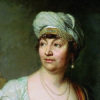Madame de Stael

Madame de Stael
Anne Louise Germaine de Staël-Holstein, commonly known as Madame de Staël, was a French woman of letters of Swiss origin whose lifetime overlapped with the events of the French Revolution and the Napoleonic era. She was one of Napoleon's principal opponents. Celebrated for her conversational eloquence, she participated actively in the political and intellectual life of her times. Her works, both critical and fictional, made their mark on the history of European Romanticism...
NationalityFrench
ProfessionWriter
Date of Birth22 April 1766
CountryFrance
Nature, who permits no two leaves to be exactly alike, has given a still greater diversity to human minds. Imitation, then, is a double murder; for it deprives both copy and original of their primitive existence.
... in the history of the human mind there has never been a useful thought or a profound truth that has not found its century and admirers.
The mind's pleasures are made to calm the tempests of the heart.
Purity of mind and conduct is the first glory of a woman.
Love is admiring with the heart. And admiring is loving with the mind.
The mind may be exhausted, but the language of the heart is inexhaustible.
Where no interest is takes in science, literature and liberal pursuits, mere facts and insignificant criticisms necessarily become the themes of discourse; and minds, strangers alike to activity and meditation, become so limited as to render all intercourse with them at once tasteless and oppressive.
The education of life perfects the thinking mind, but depraves the frivolous.
The face of a woman, whatever be the force or extent of her mind, whatever be the importance of the object she pursues, is always an obstacle or a reason in the story of her life.
The human mind always makes progress, but it is a progress in spirals.
Love is the emplem of eternity; it confounds all notions of time; effaces all memory of begining, all fear of an end.
We understand death for the first time when he puts his hand upon one whom we love
Prayer is more than meditation. In meditation, the source of strength is one's self. When one prays, he goes to a source of strength greater than his own.
Wit consists in knowing the resemblance of things that differ, and the difference of things that are alike.